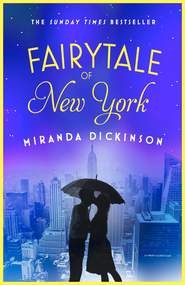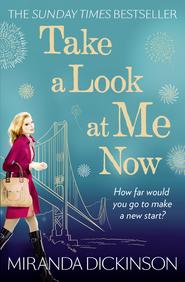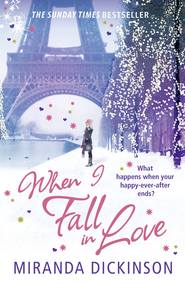По всем вопросам обращайтесь на: info@litportal.ru
(©) 2003-2025.
✖
I’ll Take New York
Автор
Год написания книги
2018
Настройки чтения
Размер шрифта
Высота строк
Поля
‘Maybe I am. Or maybe it’s been slipping away from me for months, only I wasn’t prepared to notice.’ She sighed and moved to the side as Imelda descended the steps. ‘There’s no point trying to work that one out. I just want to focus on me for a change. Is that so wrong?’
Imelda’s expression softened and she put her hand on Bea’s shoulder. ‘Of course it’s not wrong. I just want you to be happy.’
‘So do I. That’s why I want to find out how to do that by myself.’
‘O-K …’ Imelda shrugged, about as satisfied with Bea’s answer as Bea was. ‘How’s Russ been?’
That was a good question. Russ had veered between insisting that all Bea needed was time to forgive his best friend and standing staunchly alongside her in her decision. At least he seemed to have finally got the message that Bea didn’t want to talk about it now, after a week of berating her at every opportunity. Bea was relieved to feel the pressure lessen: what she wanted now was to focus on the bookstore.
‘I think he knows not to push me on it.’
Imelda smiled as she sorted through a basket of knitted meteorological symbols for her window display. ‘The guy cares about you. In his own klutzy way. And I think he’s a little embarrassed about his friend. After all, if it wasn’t for Russ, you and Otis would never have met.’
A brief memory of the party where Russ had introduced Bea to his ‘legitimate single friend who most definitely isn’t gay’ flashed across Bea’s mind and she felt her stomach twist in response. Otis Greene had caught her attention immediately, with his velvet-smooth olive skin, dark eyes that seemed to call her closer and toned body visible beneath the contours of his well-cut shirt and jeans. When he smiled, it was as if a pause button had been pressed on the rest of the scene in the bar: suddenly it was just him and her, smiles spreading as their eyes drank in the sight of one another. Bea had fallen hard and fast for the handsome art dealer – a fact she could trace back to that first meeting – and that initial surge of emotion had carried her through years of not-so-perfect times.
She didn’t want to still love Otis. She wanted to push him and everything in her life connected to him into the Hudson River and walk away, never looking back. But Bea knew her own heart. That was why striking out on her own was so important.
‘I understand why Russ tried to get us back together. I do. He’s stuck between Otis and me and I don’t suppose it’s ever been a particularly comfortable position.’
‘Shame you didn’t ask for the barman’s number, then,’ Imelda winked, twirling a large knitted raindrop around her forefinger as she ascended the stepladder again. ‘Could have solved a lot of problems …’
‘It doesn’t matter anyway: we made a pact.’
‘Who did?’
‘Me and the barman. We’re swearing off relationships for good.’
Imelda groaned. ‘Bea …’
‘No, it made me feel better, Immi. I’ve wasted too much of my life chasing something that hasn’t happened. My life is worth more than that. It was good to find someone else in this city who sees it like I do.’
‘Trust you to find a cute guy who doesn’t want to date you,’ Imelda laughed. ‘Hey, I’m not making fun of you. If it makes you happy, go for it.’
‘I think it will make me happy.’
‘Good, then. Now, do you have time for coffee before Russ sends out a search party?’
Russ had practically bundled Bea out of the bookstore that morning, seeing how distracted she was by the events of the night before.
‘You’re no use this morning. Go for a walk or something.’
Bea had instinctively headed for Beads & Beans, the quirky craft and coffee shop owned by the third Musketeer to her and Russ. Imelda Coulson had been Bea’s firm friend for almost five years and was as unconventional as her business suggested.
Imelda’s store was a riot of colour, filled with every craft item imaginable. Rainbow skeins of embroidery silks and wool were packed next to roll after roll of beautiful ribbons and trims. Almost an entire wall was filled with tiny wooden drawers containing buttons, charms, quill papers, sequins and fastenings, each drawer front bearing a hand-painted sign. Next to the haberdashery supplies were thick bolts of brightly patterned fabrics – shimmering satins, cool cottons and thick, luxurious velvets. In the centre, tables and chairs were set out, each one painted in a different pastel shade and customers congregated here, indulging in crafts while enjoying coffee and cakes on hand-painted crockery.
Bea loved it here: the strong sense of creativity and fun mirrored the boundless positivity of the store’s proprietor. It was impossible not to smile when you were surrounded by so much colour and possibility. She had first met Imelda at a mutual friend’s Christmas party and they quickly struck up a friendship, Bea drawn to Imelda’s fiercely optimistic stance on everything. They had talked about owning their own businesses one day and Bea never doubted that Imelda would succeed in her ambition. Then, around the time Russ and Bea were looking for properties to set up their bookstore, Imelda’s wish had unexpectedly come to pass.
Suddenly made redundant from her job at a Wall Street bank, she had seen it as a sign to move her life forward and had opened the business she had long dreamed of, uniting her two loves of great coffee and crafts. Only in Brooklyn could this unlikely pairing have worked. Surrounded by unusual, artisanal shops and kitsch cafés, it was a perfect fit. Imelda hosted children’s parties at weekends and various groups of craft enthusiasts and local people interested in learning new skills during the week. Everybody else came in for coffee and the unique experience of sitting in a place alive with activity and fun.
‘So how long were you and the barman talking for?’
Bea shrugged. ‘An hour, maybe? I wasn’t exactly watching the time.’
Imelda peered over the rim of her oversized coffee cup. ‘Unusual to have a conversation that lasts a whole hour which doesn’t mean anything, don’t you think? Especially if you’re still thinking about it this morning. Just what did you talk about?’
Bea couldn’t hide her smile at the memory. ‘Everything and nothing. How much we loved New York, how embarrassing it was to be single at an engagement party filled with happy couples and …’ She trailed off as the pinky shake pact came to mind.
‘And what?’
‘And then he suggested The Pact. And it was the most perfect idea I’d heard in ages. So I agreed.’
Imelda’s expression didn’t flicker, leaving Bea in no doubt of her opinion. ‘So now you need to hope that your pact-buddy will be tending the bar at the next party you go to.’
Bea had to admit that it would be good to talk to the barman again. Their conversation about the benefits of singledom had been a lot of fun. ‘As if that’s likely to happen. Apart from in your head.’
Imelda grinned. ‘Hey, my head is a nice place to be, believe me. I’m just saying, honey, it’s possible that last night was an opportunity you were meant to take. And in my experience, if life wants you to take a certain road, you’ll end up coming back to it time and time again. My great-aunt Lavinia always says life is like the baggage carousel at the airport: if you don’t collect your case first time around it will keep passing you until you do.’
Bea wasn’t sure if Jake could be compared with a suitcase – or if Imelda’s batty great-aunt’s philosophy carried any grain of truth – but it made her smile nevertheless.
‘Excuse me, do you have air-drying clay?’ A customer peered over the counter.
‘We do,’ Imelda replied, casting a wink in Bea’s direction as she headed into the store to find it.
On her own again, Bea considered what her friend had suggested. Meeting Jake had been a fluke.
Hadn’t it?
The thought was still playing on her mind that evening when Bea finally arrived home from the bookstore. Feeling better after talking with Imelda, she had returned to Hudson River Books and thrown herself into work, much to Russ’ relief.
It was almost seven p.m. when she turned her key in the front door of her apartment, swinging the paper bag of Chinese food onto the breakfast bar before taking off her coat. The thought of what had happened last night and the possibility that it might be the start of a new chapter of her life intrigued her. Not that she thought for a minute that Jake had anything to do with her future. But the very fact that she had met somebody engaging and different when only days before she had been at her lowest ebb was enough to give her hope. Relationships might be a thing of the past for her, but at least New York had proved it still had the ability to surprise her. Perhaps if the luggage carousel of life was turning in her favour, a new friend might be on the way …
CHAPTER EIGHTEEN (#ulink_183b3ff3-00d3-5ea9-b40c-cc5094404f2d)
Jake’s new office, McKevitt Buildings, Broadway (#ulink_183b3ff3-00d3-5ea9-b40c-cc5094404f2d)
Jake studied the long list of possible PA candidates in his notebook, acutely aware of how long this day was going to be. In the week following Rosie and Ed’s engagement party he had been making a determined effort to focus on practical matters, with an impressive rate of success. All around him, plastic-wrapped office furniture, still-boxed computers and a rather impressive counselling couch were testament to his recent activities. He had already confirmed details of the final design with his interior decorator and the team of painters would begin work in two days, leaving him this window of time to recruit new staff for the practice.
But there was where the problem lay: the search for a suitable replacement for Pam was proving tricky. The recruitment consultant Jake had contracted from a prestigious Manhattan personnel agency had assured him that all the shortlisted candidates were amply qualified. According to the CVs laid out on his new desk, the excellent SAT scores, Ivy League degrees and proven aptitude for clinical administration promised great things. But so far this morning, Jake had been faced with a seemingly never-ending stream of humourless, ambitious airheads bearing no resemblance to the ideal-on-paper candidates whatsoever.
‘My inspiration is Kim Kardashian,’ one candidate had earnestly informed him, ‘because of her business acumen.’ She had emphasised the words as if to add gravitas to her argument. Jake, his smile as steady as he could keep it, had nodded knowingly as he carefully drew a definite line through her name.
Another woman had blatantly misread the job description before applying for the post and was most surprised to learn that a psychiatrist did a vastly different job to a psychic. Yet another laughed when Jake asked whether she enjoyed the challenge of office administration, answering: ‘Are you nuts? It’s like dying slowly on your feet. I just need a job until my agent finds me the right movie …’
How was it possible for so many supposedly well-educated young women to be so devoid of personality, common sense or intellect? Jake strongly suspected the recruiter’s mention that the prospective client was a newly single young doctor with expensive Manhattan offices might have had more to do with the interviewees’ enthusiasm to apply for the job than their natural aptitude.
‘Why do you want to work at this practice?’ he asked the latest candidate, a softly spoken twenty-something who had listed Friedrich Nietzsche as one of her major life influences on her résumé but, when pressed, couldn’t recall any of his theories.
‘I think working for you could meet my career aspirations.’











